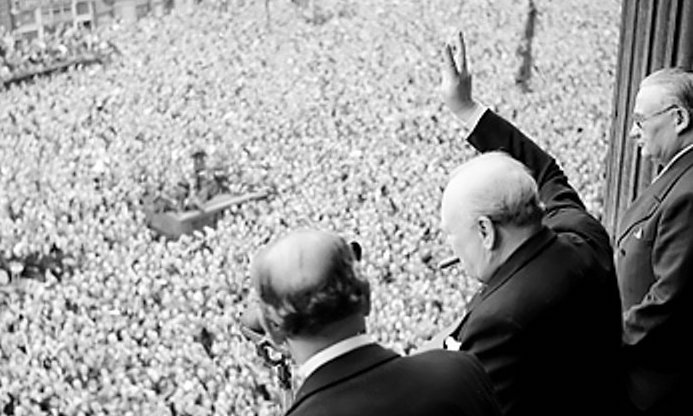
John Peck, 1945: General Eisenhower asks if the war is over….
Col. Gault (Military Assistant to General Eisenhower, 29 April 1945): “John Peck, is that you? The General told me to ask you if the war is over.”
Peck: “I beg your pardon?”
Gault: “Seriously, we’ve got a press message here which says quite clearly that it’s all over. If so, nobody has told the General and he thought you would be the most likely to know at your end.”
Peck: “Well, if it has ended, nobody has told the Prime Minister either.”
Gault: “Do you think we had better carry on?”
Peck: “Yes, I think so.” [John then went back to sleep, and the war went on.]
Joys of The Churchill Documents
It is a privilege to help edit and proof Hillsdale College‘s final document volumes in the Churchill official biography. We fall over so many gems. Here is one.
This document may be a “reject”—we can’t publish everything. It was culled by Sir Martin Gilbert for Document Volume 21. That volume will release in 2018, covering the period from January to July 1945 and the end of Churchill’s premiership. (After that, we have only two more volumes to go.)
The exchange quoted above is by former Churchill Private Secretary John Peck to Dr. Robert Price of Lexington, Massachusetts, 18 July 1981. They had met at a commemorative ceremony at Churchill’s Cabinet War Rooms in London. Price had sent Peck an article on the exchanges between Churchill and Truman, via Admiral Leahy, at the end of war in Europe (VE Day). Peck’s reply is an amusing insight, a thing we would never know otherwise. It shows us the richness of the Churchill Documents (Admiral William Leahy was Chief of Staff to Presidents Roosevelt and Truman from 1942 to 1949.)
John Peck writes:
I happen to have been the Private Secretary concerned in the Leahy/Churchill exchanges on the secret telephone on May 7th, 1945…. My recollection of events, admittedly written many years later without the benefit of official records, runs as follows:
The instrument of total unconditional surrender was signed in the small hours of 7 May 1945 and all hostilities were to cease the following midnight. Evidently, as Leahy records, Churchill had sent a telegram to President Truman, the substance of which was that he wanted to declare VE Day on 8 May. There was evidence that the President felt the same way. However, from Leahy’s telephone conversation with Churchill, it was evident that the President felt obliged to go along with Stalin‘s wishes [to delay] perhaps until 9 May….
Churchill very reluctantly acquiesced, but much later he suddenly said to me, “Go and ring the President and tell him that I have got to announce the end of the war tomorrow (the 8th) as we originally intended, as the crowds know of the German surrender.” (Or words to that effect.)
I duly put through the call, thinking it highly improbable that I should speak to President Truman himself. Indeed, the call was naturally taken by Admiral Leahy. Although it is not verbatim, the following is a pretty accurate account of our brief dialogue:
Peck: “The Prime Minister wants to announce the end of the war tomorrow. The Russians want to go on until the 9th. On balance he is inclined to go ahead and end it on the 8th.”
Leahy: “We want to end it too.”
Peck: “Right, so we will both end it tomorrow.”
Leahy: “Yes, fine, okay.”
To the best of my knowledge no record of any of these conversations was kept at the London end.
Is the War Over?
John Peck’s letter continues:
I seem to have specialised in odd telephone calls around that time. You may be amused by the following extract from an autobiographical work I once wrote recording another telephone conversation, on an open telephone line , on the night of Sunday, 29 April 1945…. [After this] I ceased to be surprised at anything.
During the weekend of 27-30 April 1945 I was on duty at Chequers [the PM’s official country residence]. On the Sunday night we had finally got the PM off to bed at 3.00 am. I had just fallen into a deep sleep when my bedside telephone rang. An apologetic telephonist put through an even more apologetic Colonel Gault, the Military Assistant to General Eisenhower, speaking from his headquarters in Reims.
Gault: “John, is that you? Sorry to bother you at this hour, but the General told me to ask you if the war is over.”
Peck: “I beg your pardon?”
Gault: “Seriously, we’ve got a press message here which says quite clearly that it’s all over. If so, nobody has told the General and he thought you would be the most likely to know at your end.”
Peck: “Well if it has ended, nobody has told the Prime Minister either.”
Gault: “Do you think we had better carry on?”
Peck: “Yes, I think so. I’ll let you know if there are any developments here.”
Gault: “Many thanks. So I can tell the General to go on with the war?”
Peck: “Yes.”
Gault: “Goodnight. Sorry to bother you.”
Peck: “Not a bit. Goodnight.”
So it was that Private Secretary John Peck, on his own recognizance, bid World War II continue. Neither Churchill, nor Truman, nor Stalin were consulted, Peck writes: “I went back to sleep, and the war went on.”







One thought on “John Peck, 1945: General Eisenhower asks if the war is over….”
Wonderful little anecdote
Comments are closed.